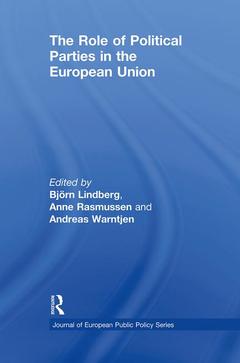Description
The Role of Political Parties in the European Union
Journal of European Public Policy Series
Coordinators: Lindberg Bjorn, Rasmussen Anne, Warntjen Andreas
Language: English
Subject for The Role of Political Parties in the European Union:
Keywords
national; party; delegations; groups; parliament; transnational; legislative; politics; group; voting; EU Legislative Politics; PSE Group; National Party Delegations; EP Party Group; Transnational Party; German MEP; Political Parties; Transnational Party Groups; ALDE Group; Transnational Parties; EU Legislative; Individual MEPs; Co-decision Report; Voting Cohesion; European Political Groups; PGL; EPP; Standing Committee Members; EU Legislative Body; Conciliation Delegates; Party Group Members; Socialist Party Group; MEPs Vote; Party Group; EU Legislative Decision Making
Publication date: 06-2013
Support: Print on demand
Publication date: 10-2009
· 15.6x23.4 cm · Hardback
Description
/li>Contents
/li>Readership
/li>Biography
/li>
At the national level, political parties play an important role in making representative democracy work. They help to aggregate and communicate policy preferences, link decision-making between different legislative bodies and hold politicians accountable. In the European Union, however, the electoral connection is weak. This casts doubt on the impact of partisan politics at the European level. Are political parties able to fulfil their role as ?transmission belts? ensuring political accountability and consistent decision-making in the European Union? To answer this question we look at the micro foundations of partisan politics in the European Union.
The contributions in this volume all depart from a common theoretical framework but use a wide range of empirical data and research designs, covering qualitative process-tracing, elite interview and large-N quantitative analysis. Moreover, they examine party effects in the electoral and legislative arena. Finally, the volume covers all European institutions: the Commission, the Council of the European Union, the European Council and the European Parliament. The findings enhance our understanding of the workings of decision-making in Brussels, add to the debate on the EU democratic deficit, and highlight the usefulness of drawing upon insights from the literature on Comparative Politics when studying the European Union.
This book was published as a special issue of the Journal of European Public Policy.
1. Party Politics as Usual? The Role of Political Parties in EU Legislative Decision-Making Bjorn Lindberg, Anne RasmussenandAndreas Warntjen 2. Who Leads, Who Follows? Re-Examining the Party–Electorate Linkages on European Integration Johan Hellstrom 3. Decision-Making Dynamics in the European Commission: Partisan, National or Sectoral? Arndt Wonka 4. Party Soldiers in a Non-Partisan Community? Party Linkage in the European Parliament Anne Rasmussen 5. Are Political Parties Controlling Legislative Decision-Making in the European Parliament? The Case of the Services Directive Bjorn Lindberg 6. Parties in the Council? Sara HagemannandBjorn Hoyland 7. Party politics in the European Council Jonas TallbergandKarl Magnus Johansson 8. The Party Political Make-Up of EU Legislative Bodies Andreas Warntjen, Simon HixandChristophe Crombez 9. Towards a Partisan Theory of EU Politics Simon Hix
Björn Lindberg is a post-doctoral researcher at the Department of Government at Uppsala University in Sweden. He has published on legislative decision-making and party politics in the EU.
Anne Rasmussen is Assistant Professor at the Department of Public administration at Leiden University (NL). She has published on EU decision-making, the role of the EU institutions and institutional change in the EU.
Andreas Warntjen is Assistant Professor of European and International Politics at the Department of Political Science and Research Methods at the University of Twente (NL). He has published on EU legislative politics and the legislative effect of the Council Presidency.




